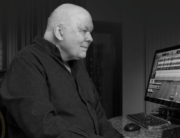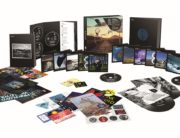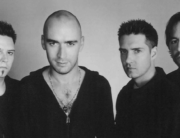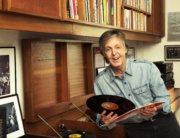BY MIKE METTLER – JANUARY 2, 2015
 “We just wanted to make the most glorious sounding thing we could.” Guitarist/keyboard programmer Charlie Burchill has perfectly described the vibe of Simple Minds’ first studio album in more than 5 years, the spot-on titled Big Music. These pioneers of late-’70s synthtronica from Glasgow, Scotland crossed over, well, big in the ’80s, transforming into a veritable MTV-age indie-rock juggernaut. They transitioned from the dance-if-you-want-to kick of “Promised You a Miracle” and the ever-ubiquitous “Don’t You (Forget About Me)” to the Celtic protest of “Belfast Child” and abject triumph of “Mandela Day.” For Big Music, the band was quite intent on blending the best of both worlds. As lead singer Jim Kerr puts it, “It’s gotta feel like old Simple Minds, but it’s also gotta feel like new Simple Minds. Talking about it is one thing, doing it is another thing. It’s still a mysterious thing, making music.”
“We just wanted to make the most glorious sounding thing we could.” Guitarist/keyboard programmer Charlie Burchill has perfectly described the vibe of Simple Minds’ first studio album in more than 5 years, the spot-on titled Big Music. These pioneers of late-’70s synthtronica from Glasgow, Scotland crossed over, well, big in the ’80s, transforming into a veritable MTV-age indie-rock juggernaut. They transitioned from the dance-if-you-want-to kick of “Promised You a Miracle” and the ever-ubiquitous “Don’t You (Forget About Me)” to the Celtic protest of “Belfast Child” and abject triumph of “Mandela Day.” For Big Music, the band was quite intent on blending the best of both worlds. As lead singer Jim Kerr puts it, “It’s gotta feel like old Simple Minds, but it’s also gotta feel like new Simple Minds. Talking about it is one thing, doing it is another thing. It’s still a mysterious thing, making music.”
Over on Digital Trends, I talked with Kerr and Burchill about things like dynamic range (Burchill: “There’s a track at the end called ‘Spirited Away’ — it’s got loads of texture and things going on. If you hear it on a great pair of monitors, you can hear the depth. That will be something great in high-res”), surround sound (“I kind of like it when there’s a bit of everything in every speaker, because then you really feel like you’re in the three-dimensional space and having something like a movie coming flying out”), and what’s missing from MP3s (“The thing I always notice that’s missing is the depth … The subtleties are gone”).
But that’s not all. Kerr, Burchill, and I also discussed our respective love of vinyl — and that conversation thread, along with Burchill’s observations about the advantages of recording to analog tape, are now presented here as a SoundBard exclusive.
Mike Mettler: There’s still something special about getting that analog feel with vinyl, wouldn’t you agree?
Jim Kerr: Yes. There really is. It’s not a hype.
Mettler: Not at all. Can you remember the first record you bought as a kid that really had an impact on you?
Kerr: The first record I actually had money to go up to a store and buy was David Bowie, Ziggy Stardust [released 1972]. I had just gotten a job. I was cleaning the backstore of this butcher shop; not the most glamorous job in the world. It was a Saturday job, but it gave me money to finally buy albums. I went up to a store in Glasgow called Listen. I think it was 1 pound 60 pence, and I got it. David Bowie was introduced to me and most of our generation by it, but he had four or five records prior to that one without commercial success. Once I got to Ziggy Stardust, I soon had five albums of his, and a whole world of stuff to get into.
But — and this links it — I bought a record secondhand from a kid in school: T. Rex, Electric Warrior (1971), which kind of set a precedent for Bowie. It gave you the feeling that something was coming over the horizon with glam rock/art rock. These were the records that, not only did I love them, but they were my records. They introduced me to the culture. You know, putting the stylus on, and absorbing everything — what was coming out of the speakers, and the artwork and the sleeve notes and all of that, and really sitting quietly and having your own thing different from your parents and different from your brothers.
Mettler: And you also sat down and listened to a record from beginning to end — the whole thing.
Kerr: Absolutely! Absolutely, the whole thing. It had to be that way. And the idea of it being 42 minutes — when I go out for jogging, I listen to 42 or 43 minutes an album. The other day, I listened to Genesis, Foxtrot (1972), which was also one of the first albums I bought. I listened to it from the first note to the last.
Mettler: I imagine you would hope people attack Big Music in that way, because you put it in a specific order for us to listen to.
Kerr: You know, that’s true. We certainly did. People are going to listen to it how they will, but that doesn’t mean we’re not going to present it in a way we think makes a better experience.
Mettler: By the time you get to the last track, “Spirited Away,” you earn that experience as a listener. In that song’s lyrics, you talking about not being a complicated guy, but I don’t know if I believe that…
Kerr: (laughs) Yeah, that was a lovely thought. Whereas “Blindfolded” was a great scene-setter, I think, emotionally, “Spirited Away” is a great way of wrapping things up, and waving bye-bye. We’ve spent some time together, and now we’re moving on.
Mettler: Ok, Charlie, your turn. What do you love about vinyl?
Charlie Burchill: I was in the generation that grew up with vinyl. Obviously, the aesthetics of the artwork is so much better, but the sound — things just sort of gel together. It sounds like vinyl forgives some of the discrepancies that are there. When you mix something, and it’s difficult to get something to sit in the right spot, you get a better clarity of some of the things that compete in different frequencies. Vinyl takes it and does something that makes it feel right — like it was meant to be, sitting together like that.
Mettler: What do you miss about the analog recording days?
Burchill: There are two things that are really terrible about working in digital. One has to do with the time that it used to take to rewind an analog tape, from the end of the song back to the beginning — in that time, you had time to reflect on what you’d just done. Chances were, you’d just done a full performance from the beginning to the end. All the time that rewind’s happening, you’re thinking of it and digesting it, stepping back from it and having a beat on it. Now it’s easier to just go, “We’ll run you back the chorus, and we’ll start straight back there and do it again.” And that means everything is radically changed. You don’t worry about the performance too much because you can always fix it.
The other major crime I think is — in the old analog world, when you were building a track, everything was built how a house would be. You had a foundation, and you built on top of that. You couldn’t change the sounds as much. Now, you work on a track that has so much information on it, and two-thirds of the way through recording the thing, you might start to change the drum sounds. And when you change one thing, everything gets changed. Then you’re really in no-man’s land. All these things are big negatives.
Mettler: What’s the best record you’ve ever heard on vinyl?
Burchill: Funny enough, I’ve come full circle, because it’s the first album I had on vinyl — L.A. Woman (1971), by The Doors. I heard it on vinyl, and I realized it’s such an amazing-sounding record; so present. You can hear [John Densmore’s] drums in particular. They don’t sound processed; they sound like drums. They’re huge. When you listen to it, you think they could be a great bar band, you know? Really amazing. And Robby Krieger, he’s one of my favorite guitar players. Totally underrated. He had a tone, and such great ideas.
Mettler: Bands of that era had all these blues and jazz chops, but they also understood a song’s foundation, and then were then able to go off into improvisation.
Burchill: Ahhh. I had L.A. Woman when I was a kid, and I thought it was the strangest-sounding music I’d heard in my life. A lot of weird stuff on it. “The Changeling,” and “Texas Radio” [i.e., “The WASP (Texas Radio and the Big Beat)].” There’s a lot of weird atmosphere on it, but it’s a lot of rhythm & blues — but with a difference. (chuckles)
Mettler: I really love that real slow-groove blues they do on “Cars Hiss by My Window.”
Burchill: Yeah, I always remember the line, “the sonic boom” [“Windows started tremblin’ / with a sonic boom”]. There’s something about the way he [Jim Morrison] sang it, I thought, “This is really weird music.” Big boom. There you go — there’s that kind of thing they do, inside of a slow blues like that, that was a different take on it.
Mettler: If you had to pick one Doors song to cover right now, what would you do?
Burchill: Well, we just did “Riders on the Storm” [for the Deluxe Edition of Big Music]. That’s a really good one. But I think now it would be, ahh (pauses)… this is difficult. I’m going to say… I know what it would be: “When the Music’s Over.”
Mettler: Oh I love that, a good 10-minute stretch-out kind of piece.
Burchill: Yeah, and it’ll be great on the keys. (chuckles)
Mettler: Any other records to cite, sound-wise?
Burchill: I was a big David Bowie fan, and The Man Who Sold the World (1970) was probably my favorite album of his. Tony Visconti was the producer. It was another album that sounded like it had this really amazing atmosphere about it. I couldn’t really define what it was, but now I realize maybe it was a lot of out-of-tune 12-string guitars (both chuckle), but the thing was — I thought it had so much reverb and atmosphere, but it’s actually quite a dry record. But vinyl managed to enhance it, and really makes it good. A little bit of reverb on a vocal — the whole warmth of what you’re listening to. You hear these colors so much better.
Mettler: The key word you said there is atmosphere. Is there anything else that sounds like this album, even in his catalog? Not really.
Burchill: Yeah, it kinda definitely was its own thing, because it doesn’t have any hits on it.
Mettler: I think, especially over here, people came to that song through Nirvana’s cover of it [during their November 1993 MTV Unplugged in New York performance, later released in November 1994].
Burchill: I remember the time Jim’s son James, who’s about 19 or 20 now, went, “I really like the cover that you did of that Nirvana song [in 2001].” And Jim said, “I don’t think it’s Nirvana.” (both laugh)










